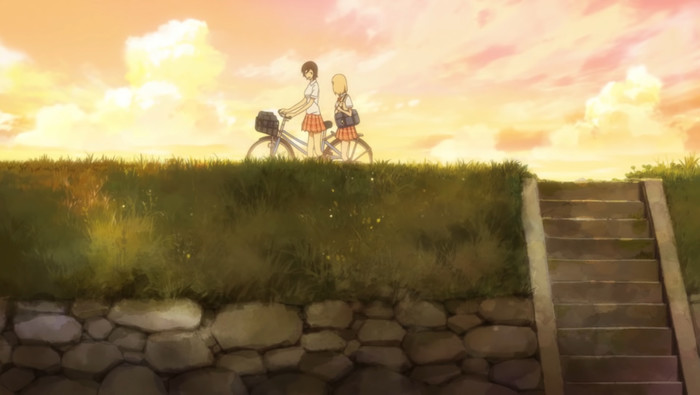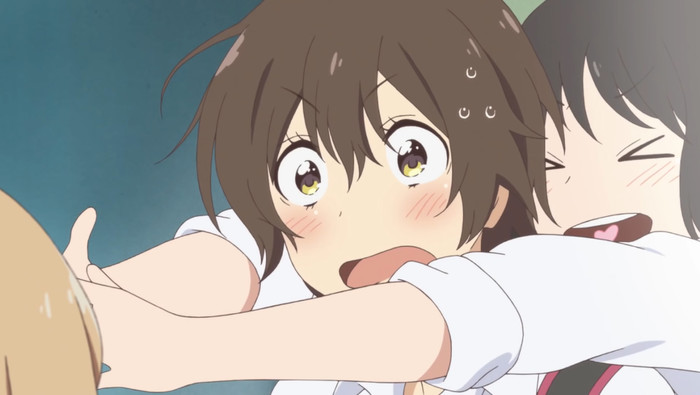Interview: Kase-san and Morning Glories Director Takuya Sato and Producer Yusuke Terada
by Zac Bertschy,If you look up industry legend Takuya Satō in Anime News Network's encyclopedia, it becomes clear very quickly that if you're watching something he worked on, there's more than just a little bit of his influence in it. On productions ranging from Strawberry Marshmallow to Selector Spread Wixoss, Sato is often listed multiple times over in the credits - director, screenwriter, animator, storyboard artist, you name it. Nowhere is this more true than in his latest project, the 60-minute OVA Kase-san and Morning Glories, a touching, ethereal and gorgeous film about the flowering romance between two young women - it's a passion project for Sato and his producer, Pony Canyon's Yūsuke Terada, both of whom were on-hand to talk about the challenge of bringing it to life at this year's Anime Expo in Los Angeles, California.

ANN: Let's talk about Kase-san and Morning Glories. This was originally an ONA, an online short, seven minutes. Do you consider that the original? Or more like a pilot film for the full version?
YUSUKE TERADA: With this OVA, the 58-minute version, it's totally different from YouTube, what you see in 7 minutes. You can consider that as completely different.
What drove you to the story Kase-san and Morning Glories? What about it speaks to you?
TAKUYA SATO: It's actually not about the story, but I really loved how these two characters love each other. Because they love each other so much and they get sometimes shy, sometimes anxious, and sometimes after some misunderstandings get understood, they're just so happy together. Those everyday little things in everyday life, I was so attracted to.
So the thing you were interested in expressing visually were the emotions specifically of the story?
SATO: Yes.
What was your approach to it this time? There's an original manga. Do you consider this to be just an adaptation of the manga? Or is there more of you and your personality in this one?
SATO: I never thought I would do totally, directly exactly the same as the manga at all. And of course, I did not want to break apart every element of the manga either. I wanted to really depict what attracted me so much to the story when I was reading the manga. That's what I was really careful about.
It's an unusual run-time – 60 minutes. It's not quite feature length, but it's not quite TV size. Did this feel like the perfect length to you? Or would you want expand it further and maybe adapt it into a TV series or something?
SATO: I'm very actually comfortable within 60 minutes. I feel that I accomplished what I wanted to depict in this film, all the definitely important points were made. And also, in terms of the length, I really did not want to make it into a TV series. There are two reasons why I didn't want to make it into a TV series. Number one, there's so many TV anime series right now in Japan. So in order to make this more special, we went with 60 minutes.
It stands out, right.
SATO: Yes, it stands out. And also, we really wanted to capture the fans' attention. So that's number one. I'm actually more a fan of the feature film format, rather than the TV program format, because it makes everything more grand. So music-wise, we used 5.1 channel instead of the TV 2.0. That would made the sound more gorgeous.

You've done virtually every job in the anime industry. There's nothing that's not in your resume. It's incredible. On this, you are listed as director, script, storyboard, unit director, sound director, key animation, planning… Is that real? And how did you have time? What was your life like during production on this?
SATO: I actually confuse myself sometimes, what is my main role… <laughter> Yes, I totally understand that you are a little confused too. It's a little different. But I love all the processes, every moment of the process.
Is it common on a production that you're involved in that you'll get involved in three or four different jobs? It seems like it. It's such an incredible filmography.
SATO: Yes, I've done all of those roles. However, this one I had the most responsibilities.
So during production on this, what was life like? Did you get any sleep? Were you in the studio all the time?
SATO: No, not much sleep. It was very heavy duty.
Right, I can only imagine. So as producer, what's it like working on a project like this with an artist like Sato? What was the biggest challenge, you would say?
TERADA: This film was proposed first to me, so it's kind of unusual. When he came to propose this idea to me at Pony Canyon, I already had the books, I already had the manga, the originals. I was already a fan. So I immediately wanted to work with him. And instinctively, I just sensed that this was going to be more successful as a film rather than a TV series. Having all the necessary elements together and the essence of Mr. Takuya Satō, I wanted to make it a Takuya Satō film. So in order to do that, I needed to let him be responsible for all these roles.

So did you take it to your colleagues at Pony Canyon? How did Pony Canyon feel about the idea? Did they have a lot of faith in it right away?
TERADA: Yeah, it was really difficult to get. All these people at my company said, “well there isn't really a clear, distinctive story, there's not many ups and downs, and it's all about everyday life of these two characters.” So everybody's worried it maybe won't sell, how are we gonna do business?
The studios are very strong. However, rather than a dramatic story, I feel like everyday ordinary lives, very subtle stories would be more in demand from here on out. That's how I feel, and I strongly believe that, so we just pushed, pushed, and pushed and we finally got approval.
How long have you been working on this project?
TERADA: In order for us to get the approval for the YouTube short one, it took us four months. It was a really condensed four months because we were communicating every day. We would modify our proposal little by little, if we didn't get approved. It took us this long, and they were really dense days.
What was the thing that got a yes from the Pony Canyon?
TERADA: What made them say yes was just us pushing, kept on pushing for so long, so long.
Wore 'em down.
TERADA: Finally they said, “well, if it's just a short on YouTube, it wouldn't be that much funding.” As a trial, they let us produce the short one. Then from YouTube we got so many comments, great comments, we actually got over five-hundred thousand viewers. So it was like, look, we've got this. We got a lot of great comments from American fans as well, through YouTube. So we're looking forward to meeting them at the premiere.

I've heard a lot of positive talk about this. Western fans seem to really enjoy it and embrace the original YouTube short. That's great. Last couple questions before I let you go - you've done virtually everything in the industry; you were the story editor on Fate:Stay/Night. I was just curious: first, describe the role of a story editor in a show like that. And could you talk a little bit about what that process was like for you?
SATO: My role on Fate/stay night was head of the scenario writers.
So on something like that, where you're adapting this giant, huge Nasu text. What was that like for you? How challenging was it? That must be so different from just writing a screenplay or adapting a manga.
SATO: It's impossible to make Nasu's text shorter. I was really in very close communication with Nasu, and we discussed each point, “this is something that we cannot get rid of.” And we wanted to concentrate on those, what are the ones that we really have to have in the story. And then we had to eliminate what could be eliminated, so we were in close communication about that. He's a monster, in terms of text. He says so himself.
Would you be content just directing for the rest of your career? Or do you think you'll always just dip into every job? Is that more your speed?
SATO: Yes, I wanna. I want to be responsible for a lot of different things. Whatever I can do, I wanna do.
Last question: you're a busy creative professional, but do you find time to watch anime and TV and movies?
SATO: Yeah, so many. Mostly films. Both of us are film nerds.
What are some of your favorites?
A: 2001, A Space Odyssey, The Dark Knight. Christopher Nolan and David Fincher. I really like David Fincher, especially Seven.
That's still his best I think, still his best movie.
I agree! Also The Social Network, I really liked that opening music.
That music during the opening credits where he's walking through Harvard, it's excellent.
I love that music. We actually got influenced by that in terms of the music for this movie. It's a quiet loneliness.
Our thanks to Anime Expo, Pony Canyon, Takuya Satō and Yūsuke Terada for the opportunity.
discuss this in the forum (4 posts) |
this article has been modified since it was originally posted; see change history